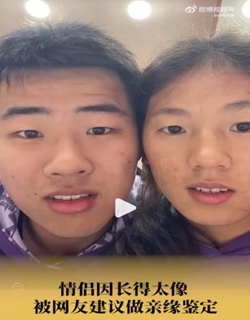
A couple who looked strikingly similar to each other Photo: Screenshot from Sina Weibo
Recently in Chengdu, Sichuan Province, a couple who looked strikingly similar to each other posted a photo on social media, leading netizens to mistake them for siblings, who suggest they undergo a DNA test to determine if they were indeed related.
On May 26, the couple posted a video where they showcased a transformation video. After their magical makeover, the resemblance between the two was uncanny. The video garnered over 700,000 likes, 196,000 views, and more than two million shares.
Many netizens left comments, urging the couple to undergo a DNA test, questioning if they were truly siblings.
On May 27, one of the pair, Liu, revealed that the test results showed a probability of relation less than 0.0001%, confirming that they were not blood-related. The DNA test was conducted to satisfy the curiosity of netizens, and both sets of parents were aware that there was no blood relation between the couple.
Many netizens were amazed by the revelation, exclaiming that this was the epitome of a match made in heaven. Some commented that the resemblance was not surprising and attributed it to the concept of having a "couple's face." Others joked that the lookalike couple could unlock each other's phones.
From a scientific perspective, one netizen explained that couples who share a strong emotional bond and frequent kisses would exchange microbiomes, leading to a gradual resemblance over time. While the existence of a "couple's face" remains a topic of debate, studies have shown that long-term partners often bear a resemblance to each other.
To delve deeper into the phenomenon, a research team at Stanford University has collected photo data from 517 married couples, taken shortly after their wedding and decades later. The results indicated that while long-term partners may appear similar, they do not necessarily become more alike over time. This supports the theory that individuals tend to choose partners who resemble themselves.
Although physical appearance may not evolve to become more alike, the microbial communities on our skin do. The impact of cohabitation on microbiomes is so significant that computer algorithms can accurately determine cohabiting partners based solely on skin microbiomes, with an 86 percent accuracy rate. Interestingly, the body part with the most similar microbial community among cohabiting partners is the feet.
Global Times

